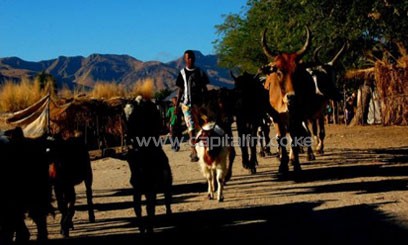
Cattle rustling had taken a new dimension, moving away from the cultural practice it once was to a high level commercial activity/FILE
The communities who were joined by the Kenya Human Rights Commission (KHRC) on Saturday argued that cattle rustling was no longer a cultural practice and the change would help deal with potential cattle thieves appropriately.
Isiolo Human Rights Network Coordinator Joseph Kalapata added that it would ensure that offenders got the same penalty as violent robbers and deter such acts.
He expressed concern that things were getting out of hand and it was important for the government to go beyond the rhetoric in fighting the menace.
“You will find that the cattle thieves from Meru collude with those from Turkana or Borana because the ones from Meru know where the cattle are and the Borana provide the market. That is why we are saying it is a major business and not a cultural thing,” he argued.
One of the victims of cattle theft Nasaro Kiriambo, made a passionate appeal to the government saying an urgent and thorough disarmament exercise should be conducted.
She told journalists that several Kenyans had been displaced and were afraid of going back to their homes because of the frequent raids.
“We have been living in the forests and the government has not yet conducted any security operation. These raids are facilitated by the guns and gun shots have become the order of the day. If we get rid of the guns things might return to normalcy,” she explained.
KHRC Programme Officer in charge of security sector Lillian Kantai further called for a well coordinated and simultaneous disarmament exercise in the region saying it was the only way to ensure the communities remained unarmed.
Kantai explained that the frequent cross border interactions meant that governments had to jointly disarm their populace as means of keeping the often brutal raids at bay.
She also reminded East African countries of the promises they made when they signed the Protocol on the Prevention, Combating and Eradication of Cattle Thefts in Eastern Africa.
“If you focus on disarming communities in one country, they might take their arms across the border and when the disarmament exercise is over, they go get them back,” she explained.
KHRC Senior Programme Officer in charge of civil and political rights George Morara also noted that cattle rustling had taken a new dimension, moving away from the cultural practice it once was to a high level commercial activity.
He explained that the joint peace efforts that the government was facilitating would not bear fruit because it was the wrong approach.
“What we are saying is that the culture of cattle rustling no longer exists. We want to call it what it is and that is cattle robbery. It is only people who are holding on to the tag of cattle rustling to perpetuate incidence of criminal activity,” he argued.
KHRC further claimed that more than 100 lives had been lost since last December as a result of cattle theft.
Baringo Human Rights Consortium Coordinator Kipruto Kimosop asked the government to tighten border points and stop the infiltration of small arms.
He explained that cattle rustling was previously a cultural practice where young morans would raid neighbouring villages in search of livestock to pay for dowry.









































